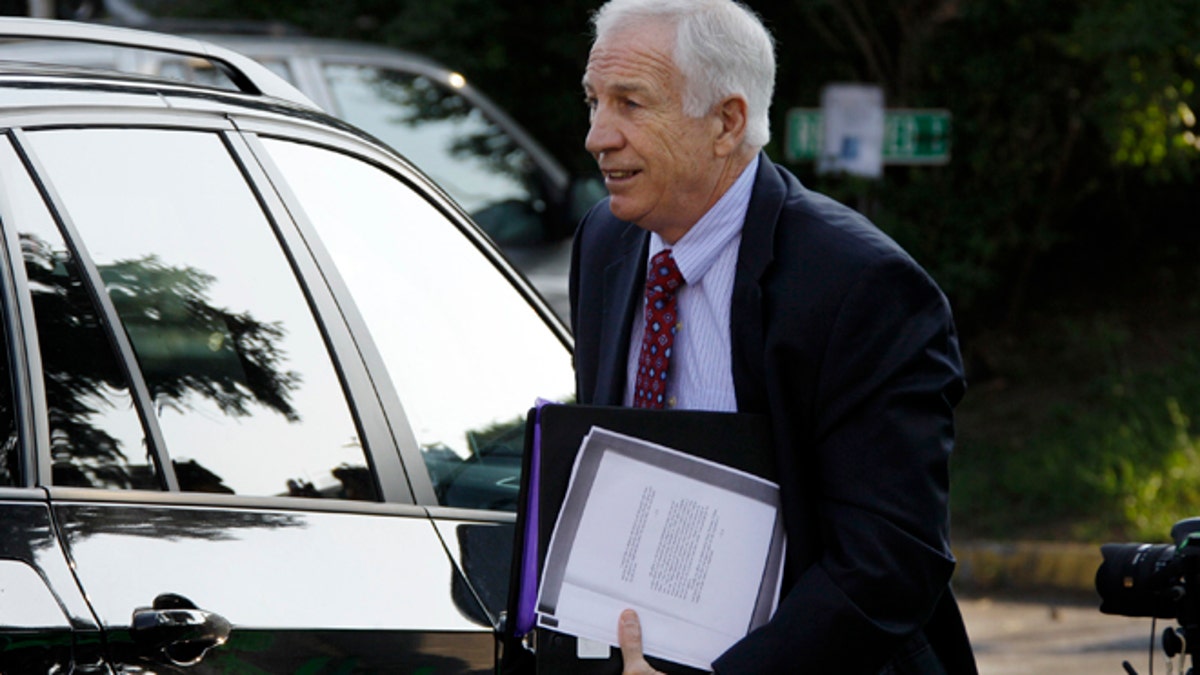
June 20: Former Penn State University assistant football coach Jerry Sandusky arrives at the Centre County Courthouse in Bellefonte, Pa. (AP)
HARRISBURG, Pa. – Now that a settlement has cleared the way for $60 million from Penn State to be spent in Pennsylvania to address child sexual abuse, potential recipients are starting to think about how that money might be put to use.
"There's certainly a tremendous need," said Linda Rosenberg, executive director of the Pennsylvania Commission on Crime and Delinquency. "In the area of child sexual abuse, I don't know if there's ever enough money to help support the need."
The Jan. 16 deal that ended litigation by two state officials against Penn State and the NCAA split up the money, with $12 million being retained by the university and $48 million going to Rosenberg's agency.
Penn State agreed to the $60 million fine in 2012, as part of a consent decree with the NCAA over the university's handling of the Jerry Sandusky child molestation scandal. Soon after, the state senator who represents the State College area, Majority Leader Jake Corman, pushed through the Institution of Higher Education Monetary Penalty Endowment Act to prevent the money from being sent out of state.
Corman argued that state money helped fund Penn State, and much of the money would come from state residents.
The Endowment Act dictated five purposes for the money: preventing child sexual abuse or helping its victims, supporting investigative teams, aiding victim services' groups that work with children, training about how to report or treat child abuse victims, and operating child advocacy centers.
Rosenberg said half of the $48 million going to her agency is expected to be doled out in grants over the next five years. The other will fund an endowment, with additional grants funded out of the investment proceeds.
The commission plans to identify areas with the greatest needs and then solicit applications, probably starting in early July. The first grants may be going out by October.
The Pennsylvania Coalition Against Rape is among the groups waiting for application details.
"There are 50 rape crisis centers in Pennsylvania who are serving child victims as well as adult survivors of child sexual assaults," said coalition spokeswoman Kristen Houser. "We certainly expect that our network will be applying in one capacity or another."
Abbie Newman, director of the Mission Kids Child Advocacy Center in East Norriton and a member of the state child advocacy center board, said an infusion of new money could help expand existing centers and establish them in new areas. Child advocacy centers, specifically named in the Endowment Act, bring together police, child welfare authorities, prosecutors and others to tackle child abuse cases.
"Every time a child reports child abuse, if they're in an area that does not have a CAC, there is a very good likelihood that that child is going to be re-traumatized by the systems that are put in place to help them. Having a CAC decreases the trauma to the child and puts that child on the road to healing," Newman said.
Joan Benso, chief executive of Pennsylvania Partnerships for Children, said there is also a need for help with the costs of additional background clearances required for those who work with children, including teachers, school volunteers and youth coaches.
The costs of clearances raised concerns they could have the unintentional outcome of limiting opportunities for children, she said.
"A fund to help defray the costs for those who cannot afford them could lessen these concerns while still achieving the most important goal: keeping our kids safe," Benso said.
Penn State recently announced its $12 million will set up an endowment fund at its Network on Child Protection and Well-Being, an entity established in 2012, in response to the Sandusky scandal.
Jennie Noll, a human development and family studies professor who directs the network, expects the money to generate $400,000 to $500,000 a year to fund research into detecting and preventing child abuse.
It will also pay for conferences, workshops and similar events, fund interdisciplinary cooperation, and help upgrade Transforming Lives of Children, a research and treatment clinic in Harrisburg that is run by a Penn State Hershey Children's Hospital pediatrics professor.
Noll said Penn State has hired five of the 12 new faculty members for the network, but none of the fine money will pay for salaries.
"The endowment is strictly for operations to facilitate the research," Noll said. "You're not going to build a building -- or use it right away."
The Endowment Act requires annual reports to the Legislature about how the money is spent.







































